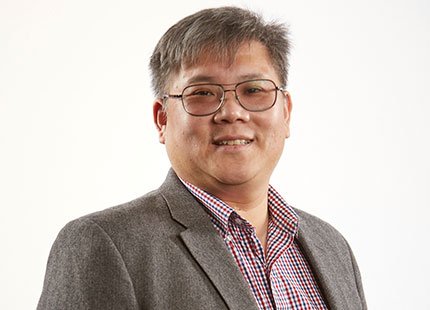
Andrew Jung
Professor, Computer Science Department
Andrew Jung
Dr. Changyong (Andrew) Jung has been teaching in the Computer Science Department at Framingham State since 2014. He holds a master’s degree in Computer Science from Ball State University and a PhD in Computer Science from Virginia Commonwealth University. Dr. Jung and a colleague from Texas A&M recently developed a prototype version of an artificial pancreas for control of diabetes. They are currently working on a system that would allow people with diabetes to monitor their glucose levels using a phone application that could warn them when levels become dangerous. The first paper on their research was accepted to the International Conference on Biomedical and Health Informatics in Las Vegas, where Dr. Jung presented on February 25th.
What do you enjoy most about teaching at FSU?
Framingham State has a classroom environment where you can interact closely with the students. Classes are small enough that students can ask questions and share their opinions, and through these interactions there is a broader exchange of knowledge. I think that is really beneficial to the learning process. Right now, I’m teaching HTML, CSS and JavaScript; Software Engineering; and Graphic User Interface Design using Java. This summer, I’ll be teaching a Web and Mobile Application course.
What are the major strengths of the University’s Computer Science Department?
I think we have really good Computer Science programs that have two different concentrations: Computer Science General and Information Systems. Students get exposed to both and can choose which is more suitable for their future. Faculty in the program are very energetic and highly motivated, and there is an overall commitment to excellence and diversity. Technology changes rapidly, so we are always updating and changing the curriculum to expose students to the latest developments and newest technology. We are eager to teach the next generation of computer scientists who will be committed to developing technology for the world. I think another big strength is our co-op program, which provides students with the opportunity to work at companies in the region and learn real-world skills before they graduate.
What are some of your current research areas of interest?
I have several research interests, including survivable wireless sensor networks, molecular communications and educational software development for student success. I’m interested in areas where I think I can have a positive impact on the world. A colleague of mine and I decided to work on solutions for people with diabetes after reading several articles on how many people in the United States suffer from the disease. We felt it was an area where we could make an impact.
What sort of technology have you been working on related to diabetes control?
I worked with a team that included my friend, who is an electrical engineer, and a medical doctor to develop the prototype of an artificial pancreas that could help control blood glucose levels. Today, we are working on technology that could allow patients to monitor their glucose levels through an application on their cell phone that works in conjunction with an artificial pancreas. The application could let patients know when and how much insulin should be injected into their bodies and warn them when glucose levels become dangerously low, which can be life threatening. If a patient became unresponsive to a warning, it could automatically connect to 911 and potentially save that person’s life. We have received grant money to purchase glucose-monitoring equipment as part of the effort, and are currently seeking additional grants.
